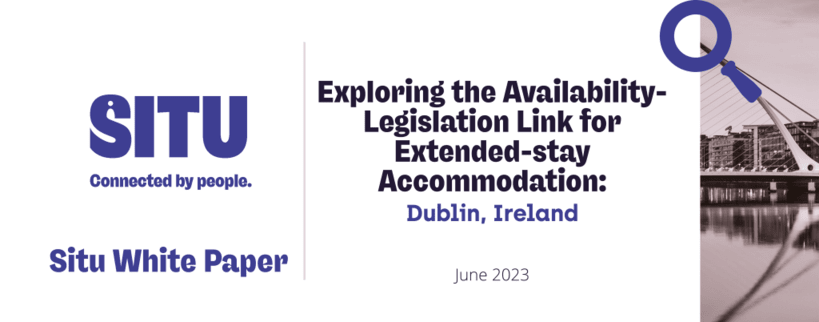The low corporation tax rates that Ireland offers to tech and pharma companies has made the republic an attractive place to relocate to – and their employees all need somewhere to live. Given the amount that these employees can afford to pay, demand has soared in recent years, as well as prices. Those working in the tourism and hospitality sector also need housing to support the infrastructure and are greatly impacted. As in other countries and cities, there are new regulations that have come under consideration in Dublin to regulate the short-term rental market. These intend to address concerns about health and safety, disruption to local communities, and release housing stock used for short-term rental back to the market for long-term rent or purchase .

Available accommodation for short-term travellers is at a premium in the city. According to a report commissioned by the National Tourism Development Authority (Fáilte Ireland), over the five years to 2020, tourist arrivals to Dublin grew by 33%, yet the stock of available accommodation fell by 6%ii; with the return of tourist travel post-pandemic bringing the extent of this shortfall into sharp relief.
As in Edinburgh, major events in Dublin such as festivals and sporting fixtures put pressure on availability and drive prices up. At the same time, bookers trying to find extended-stay accommodation for those relocating to Dublin require long lead times to find suitable and affordable accommodation.
In Ireland, new regulations include a short-term rental registration schemeiii which was due to start in April 2023 but has been postponed until December 2023. The law states that short-term suppliers offering accommodation for periods of up to and including 21 nights (but up to 14 nights in Dublin) need to be registered with the National Tourism Development Authority. The scheme will be managed by Fáilte Ireland via a registration portal where property owners/ operators will self-register every year. Properties will receive a registration number and will need to display this on any advertising. There will be a fine for both the operator and the marketing platforms they advertise on if this rule is not adhered to.
A planning requirement is also present. Rent Pressure Zones (RPZs), where demand for residential housing is highest, have been identified and include Dublin. Those engaging in short-term lets here must be registered with Dublin City Council. In an RPZ such as Dublin, short-term lets of a principal residence, or one given out for long-term rent, can engage in short-term lets of up to 14 consecutive nights to the same guest and up to 90 days a year. More than this number of nights requires planning permission, unless the property is exempt or already in possession of such a licenceiv.
The legislation does make a distinction between short stays and ‘corporate/ executive lets’, with the involvement of the extended stay sector having assisted in awareness raising among regulators. The rules apply to the whole of Ireland and say that operators of corporate/ executive accommodation can let properties for a 14-night minimum and do not need to join the short-term accommodation register. It is interesting that Ireland states that it has taken note of licensing for short-term stays in other cities: “The Fáilte Ireland STTL register has been designed with the benefit of experiences elsewhere including Amsterdam, Scotland, and Paris and…it will be compatible with the EU Commission register proposal.”v
Ireland seems to have come down on the side of stricter regulation for Dublin and potentially other cities that may be designated as RPZs. But as in these other cities, stricter regulation on short-term stays will likely cause inventory to fall as private landlords drop out of the market. Addressing the housing issues in this way in Dublin, as in other cities, will affect the short-stay sector and the extended-stay sector as well. As owner-operators find it more difficult to rent out their properties, and as a result begin to move out of the sector, there will be less variety and number of different properties available for guests to stay in. This may even encourage an aparthotel model with investors keen to take advantage of the ability to house short-stay guests as well as gain exposure to the extended-stay sector – and the returns that this can bring in a market such as Dublin.
Access Full White PaperDo you need a stay in Dublin? Do browse our selection of great Situ serviced apartments in Dublin, or pick up the phone and give one of our friendly accommodation specialists a call at +44 (0)1392 690 079.

